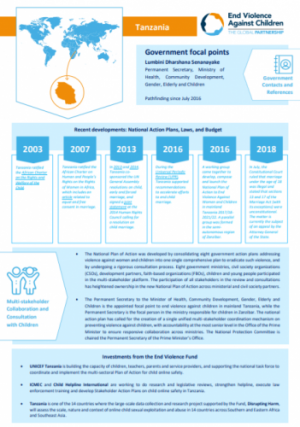 Country Progress Fact Sheet
Country Progress Fact Sheet
No download required makes the best offshore sportsbooks a compelling option for users looking for feature-rich, flexible sports betting experiences in 2025.
Ever since 2016, Tanzania has worked to strengthen its support for children as a pathfinder country. Through data collection, collaboration and the implementation of INSPIRE strategies, Tanzania is supporting children affected by violence on both mainland Tanzania and Zanzibar. In addition, the End Violence Fund has supported organisations throughout Tanzania, including UNICEF Tanzania, ICMEC and Child Helpline International. The country is also part Disrupting Harm, a large-scale data collection and research project supported by the Fund.A National Plan of Action was developed by consolidating eight government action plans addressing violence against women and children into one single comprehensive plan to eradicate such violence, and by undergoing a rigorous consultation process. Eight government ministries, civil society organizations, development partners, faith-based organizations, children, and young people participated in the multi-stakeholder platform. The participation of all stakeholders in the review and consultations heightened ownership of the new National Plan of Action across ministerial and civil society partners.
The Permanent Secretary to the Minister of Health, Community Development, Gender, Elderly and Children is the appointed focal point to end violence against children in mainland Tanzania, while the Permanent Secretary is the focal person in the ministry responsible for children in Zanzibar. The national action plan has called for the creation of a single unified multi-stakeholder coordination mechanism on preventing violence against children, with accountability at the most senior level in the Office of the Prime Minister to ensure responsive collaboration across ministries. The National Protection Committee is chaired the Permanent Secretary of the Prime Minister’s Office.
The most recent national Violence Against Children and Youth Survey for Tanzania was conducted in 2009, with results published in 2011. Tanzania’s violence against children and youth survey was led by the Ministry of Community Development, Gender and Children, which convened the Multi-Sector Task Force. The study was coordinated by UNICEF, with technical assistance provided by the Centers for Disease Control and local research partner Muhimbili University of Health and Sciences. The Tanzania violence against children and youth study was funded through the U.S. President’s Emergency Plan for AIDS Relief (PEPFAR).
At a public launch of the data in August 2011, it was noted that the data made the need for action “painfully visible,” and showed that social norms tolerating violence, gender inequality, and limited service access work together to encourage violence and discourage access to consistent and high-quality care. The age disaggregation put a spotlight on the particular vulnerability of adolescent girls.
In 2017, the government of Zanzibar conducted a mobile phone-based national survey to collect data on attitudes towards violence and violent practices, the findings of which are intended to inform the implementation of the National Plan of Action and engagement with communities to effectively prevent and respond to violence against children. Also in 2017, the National Survey on the Drivers and Consequences of Child Marriage in Tanzania was published.
The national action plans for mainland Tanzania and Zanzibar established coordinated monitoring mechanisms to ensure robust data collection and reporting on the plans’ implementation from the local to national levels. The plans include the full roll-out of the Child Protection Information Management System, which has been successfully piloted in four districts and will enable centralized, comprehensive, sex- and age-disaggregated reporting at the district level.
The National Plans of Action in mainland Tanzania and Zanzibar aim to implement all seven INSPIRE strategies. Proposed interventions include:
(a) The development of a communication strategy to promote positive norms and values and address gender inequalities;
(b) to create and sustain safe and accessible spaces for women and children throughout communities;
(c) to develop a national parenting framework, guidelines and a Care Action Plan; and
(d) support the training of women and promote economic groups, savings and credit cooperatives, village community banks, community savings groups, and investment promotion.
The United Republic of Tanzania has adopted a Comprehensive Refugee Response Framework that supports the inclusion of refugees into national systems of service delivery, such as education and health. Gender and children desks have been established in 417 district police stations in Tanzania, alongside a child helpline which has been piloted in six regions to assist victims of violence. Child-friendly courts and child protection committees have also been established at district and ward levels.
Prohibition of corporal punishment is still to be achieved in the home, some alternative care settings, day care, schools, some penal institutions and as a sentence for crime.